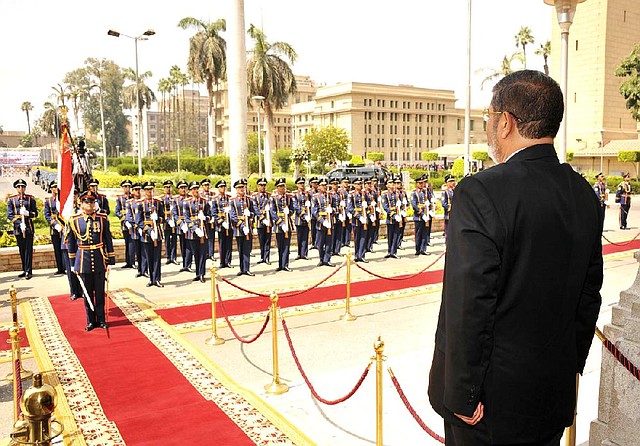Morsi assumes office in Egypt
Islamist embraces democracy, vows support for military
In this image released by the Egyptian Presidency, Egyptian President Mohammed Morsi stands before a military honor guard after his inauguration in Cairo, Egypt, Saturday, June 30, 2012. Islamist Mohammed Morsi promised a "new Egypt" and unwavering support to the powerful military as he took the oath of office Saturday to become the country's first freely elected president, succeeding Hosni Mubarak who was ousted 16 months ago. (AP Photo/Ahmed Fouad, Egyptian Presidency)
Sunday, July 1, 2012
CAIRO — Islamist Mohammed Morsi promised a “new Egypt” and unwavering support to the powerful military as he took the oath of office Saturday to become the country’s first freely elected president, succeeding Hosni Mubarak, who was ousted 16 months ago.
In a solemn inauguration ceremony before the Supreme Constitutional Court, Morsi also became the Arab world’s first freely elected Islamist president and Egypt’s fifth head of state since the overthrow of the monarchy some 60 years ago.
“We aspire to a better tomorrow, a new Egypt and a second republic,” Morsi said before the black-robed judges in the court’s Nile-side headquarters built to resemble an ancient Egyptian temple.
“Today, the Egyptian people laid the foundation of a new life - absolute freedom, a genuine democracy and stability,” said Morsi, a 60-yearold U.S.-trained engineerfrom the Muslim Brotherhood, a fundamentalist group that has spent most of the 84 years since its inception as an outlawed organization harshly targeted by successive governments.
He later delivered his inauguration address at a gigantic Cairo University lecture hall packed with several thousands, including many members of the Islamistdominated parliament dissolved by the military earlier in June.
Morsi repeated his oath of off ice and lavishly praised the military, which has rushed a series of decrees last month that stripped Morsi of significant powers, gave it legislative power and took control of the process of drafting a permanent constitution.
It has also retained its influence on key domestic and foreign-policy issues.
“The armed forces are the shield and sword of the nation,” he said. “I pledge before God that I will safeguard that institution, soldiers and commanders, raise its prestige and support it with all the powers available to me so it can be stronger.”
But Morsi also appeared later in the address to urge the military to hand over all powers to his elected administration.
“The [ruling] Supreme Council of the Armed Forces has honored its promise not to be a substitute for the popular will and the elected institutions will now return to carry out their duties as the glorious Egyptian army returns to being devoted to its mission of defending the nation’s borders and security,” he said.
Military ruler Field Marshal Hussein Tantawi was in attendance along with other generals from the ruling council.
His arrival at the hall was greeted by chants of “the army and the people are one hand.” He and Gen. Sami Anan, the powerful chief of staff, wore blank faces throughout Morsi’s address, occasionally offering support to Morsi with a polite clap of their hands.
Later at a military ceremony held at a base east of Cairo, Tantawi and Anan saluted Morsi as he arrived and awarded him the “shield of the Armed Forces” - the Egyptian military’s highest honor.
Morsi also received a 21-gun salute before he and Tantawi addressed the ceremony.
Morsi used his Cairo University address to send an implicit message of reassurance to Israel, whilealso pledging support for the “legitimate rights” of the Palestinians.
He said his administration would continue to honor its international treaties - a thinly veiled reference to the 1979 Egyptian-Israeli peace treaty.
Relations between the two neighbors have become particularly tense since last year’s overthrow of Mubarak, who had forged close ties with the Jewish state during his 29-year rule.
The rise to power of Egyptian Islamists has been a source of alarm among many Israelis.
Hundreds of soldiers and policemen guarded the Supreme Constitutional Court building as Morsi arrived shortly after 11 a.m. local time in a small motorcade to take the oath of office.
Only several hundred supporters gathered outside the court to cheer the new president and, in a departure from the presidential pomp of the Mubarak era, traffic was only briefly halted to allow Morsi’s motorcade through on the usually busy road linking the city center with its southern suburbs.
In another sign of the change of style, Morsi began his address at Cairo University with an apology to students whose final exams had to be postponed to allow the ceremony to be held at the main campus.
He was given an official welcome at the university with a military band playing the national anthem as he stood at attention.
Saturday’s swearing-in also marked a personal triumph for Morsi, who was not the Brotherhood’s first choice as president and was only thrown into the race when the group’s original candidate, chief strategist and financier Khairat el-Shater, was disqualif ied over a Mubarak-era criminal conviction.
Morsi took a symbolic oath Friday in Tahrir Square, the birthplace of the uprising that ended Mubarak’s authoritarian rule last year, and vowed to reclaim presidential powers stripped from his office by the military council that took over from the ousted leader.
Front Section, Pages 1 on 07/01/2012
